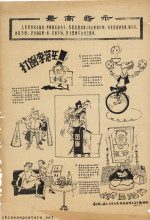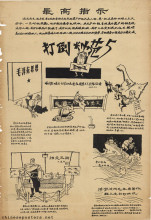Li Fanwu (1912-1986), formerly known as Li Fude (李福德), used to be named Zhang Song (张松). He was born in Muling County, Heilongjiang Province. He joined the CCP in 1932 and was one of the early organizers and leaders of the Northeast Anti-Resistance Alliance; and an important leader of the country's rubber industry. He served as the Organization Minister and Acting Secretary of the Jidong Special Committee of the CCP; as the First Deputy Minister and Party Secretary of the Ministry of Forestry; as Governor of Heilongjiang Province; as the Second Secretary of the Heilongjiang Provincial Committee of the CCP; and as the Second Political Commissar of the Provincial Military Region.
He was severely persecuted during the "Cultural Revolution" and was imprisoned for eight years and forced to undergo labor reform for three years; he was severely tortured mentally and physically. As he had studied in his youth at the Russian School of Law and Political Science at Peking University, he was accused of being a Soviet spy. He was falsely accused of sexually assaulting a female student and was criticized and dismissed from power. He also was accused of being a counterrevolutionary by the Red Guards (Mao Yuanxin and his 65th Corps) because of a photo of him in which his hairstyle was very similar to Mao Zedong's. His second daughter Li Lili (李黎力, Dong Biwu's daughter-in-law) was sent to a labor camp. After the "Gang of Four" was overthrown, all the accusations against him were rescinded and his reputation was restored.
Li Zhengsheng, Red-Color News Soldier (Phaidon Press, 2003) contains a number of photographs of Li being manhandled by Red Guards.

